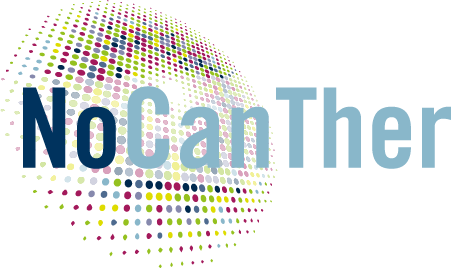IMDEA Nanociencia coordinated NOCANTHER project enrolls the first patient in a clinical trial
18.03.2022

- The Horizon-2020-funded NoCanTher Consortium has designed and developed a novel anti-cancer strategy combining the implantation of magnetic nanoparticles in tumors with magnetic hyperthermia treatment, which potentiates the efficacy of chemotherapy in locally advanced pancreatic cancer.
- NoCanTher is coordinated by the IMDEA Nanoscience Institute (IMDEA Nanociencia, Madrid, Spain), and counts on the participation of other experts from multiple disciplines at eleven different national and international research centers, including investigators at the Vall d’Hebron Barcelona Hospital Campus.
- Constituting the final phase of the NoCanTher project, a clinical study led by the Vall d’Hebron Institute of Oncology (VHIO) and based on results obtained from preclinical research in animal models, has now launched.
- The CIBBIM-Nanomedicine Group at the Vall d’Hebron Research Institute (VHIR) has played a crucial role in developing these iron magnetic nanoparticles that generate hyperthermia and kill tumor cells.
- The first patient with locally advanced pancreatic cancer is now receiving treatment with this novel strategy at Vall d’Hebron University Hospital.
Barcelona, 18th March 2022– The EU-funded NoCanTher project has enrolled the first patient in the clinical trial led by Vall d’Hebron Institute of Oncology (VHIO), representing an important step in bringing in nano-driven therapeutics as novel weaponry in the current arsenal of anti-cancer technologies. Specifically, this multi-center Consortium, which launched in 2016 and is powered by eleven European partners, is leading the development of magnetic nanoparticles for the treatment of locally advanced pancreatic cancer.
When exposed to a time-varying magnetic field, these nanoparticles generate hyperthermia and directly destroy tumor cells. This novel strategy, in combination with chemotherapy, aims at inactivating cancer cells and achieving tumor shrinkage. In addition, the intracellular delivery of these nanoparticles promises to reduce the adverse effects associated with chemotherapy. VHIO is the very first Spanish research center to apply this nanotechnology-based therapy at the clinical level.
“This clinical trial has been designed for patients with locally advanced pancreatic cancer. These tumors are not metastatic but cannot be surgically removed, and currently, the only treatment option for these patients is palliative chemotherapy. Considering that this patient population accounts for twenty per cent of all pancreatic cancer cases and that these patients have a five-year survival rate at five percent, more effective strategies must be sought and developed to improve clinical outcomes” said Teresa Macarulla, Principal Investigator of VHIO’s Gastrointestinal & Endocrine Tumours Group, Medical Oncologist at the Vall d’Hebron University Hospital’s Medical Oncology Department and leader of this clinical study.
Now launched with the enrolment of the first patient, this clinical study is based on the results obtained in the preclinical phase of the NoCanTher project, throughout which the Vall d’Hebron Research Institute’s (VHIR) CIBBIM-Nanomedicine Drug Delivery and Targeting Research Group, led by Ibane Abasolo, played a key role.
Specifically, this preclinical work led by VHIR and the Fuenlabrada University Hospital (Madrid, Spain), verified the efficacy of nanoparticles in animal models with implanted patient-derived pancreatic tumours that were previously induced. These studies showed that when nanoparticles are injected directly into tumors, the generated hyperthermia achieves cancer shrinkage and alters the characteristics of tumors that facilitates the direct delivery of chemotherapy. “We are now going one step further with the application of this new technology in patients, and hope that this approach will improve clinical outcomes,” added Teresea Macarulla.
This strategy, based on magnetic iron oxide nanoparticles, allows heat to be exclusively applied to the area where the nanoparticles are located —in this case, pancreatic tumours— without harming the surrounding healthy tissues. Magnetic hyperthermia, together with the administration of standard chemotherapy, can transform electromagnetic energy into heat in order to destroy tumour cells and locally control cancer growth. A magnetic field generator (NTT Generator), which has been specifically designed and developed by consortium partner Resonant Circuits Limted for the localized generation of thermal energy within tumors, is being used in this clinical study.
“This pilot study promises potential new therapeutic avenues for patients with locally advanced pancreatic cancer, for whom there are no other treatment options available except chemotherapy,” concluded Teresa Macarulla.
Partly funded by the European Union’s Horizon 2020 research and innovation programme under grant agreement ID: 685795, NoCanTher is coordinated by IMDEA Nanociencia (Madrid, Spain) and counts on the participation and expertise of national and international research centres: BioKeralty Research Institute (Miñano, Spain), ImmuPharma (London, England), Chemicell (Berlin, Germany), Jena University Hospital (Jena, Germany), Resonant Circuits Limited (London, England), the Vall d’Hebron Research Institute (VHIR; Barcelona, Spain), the Vall d’Hebron Institute of Oncology (VHIO; Barcelona, Spain), Trinity College (Dublin, Ireland), Université Paris Diderot (Paris, France), and the Fuenlabrada University Hospital (Madrid, Spain).

Source: Vall D'Hebron Institute of Oncology




